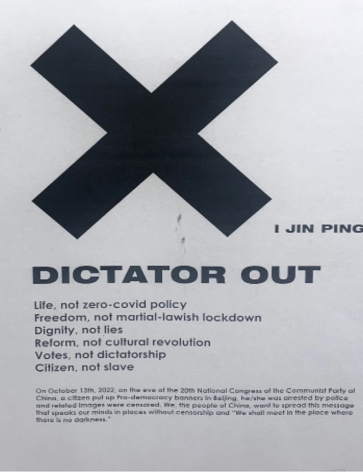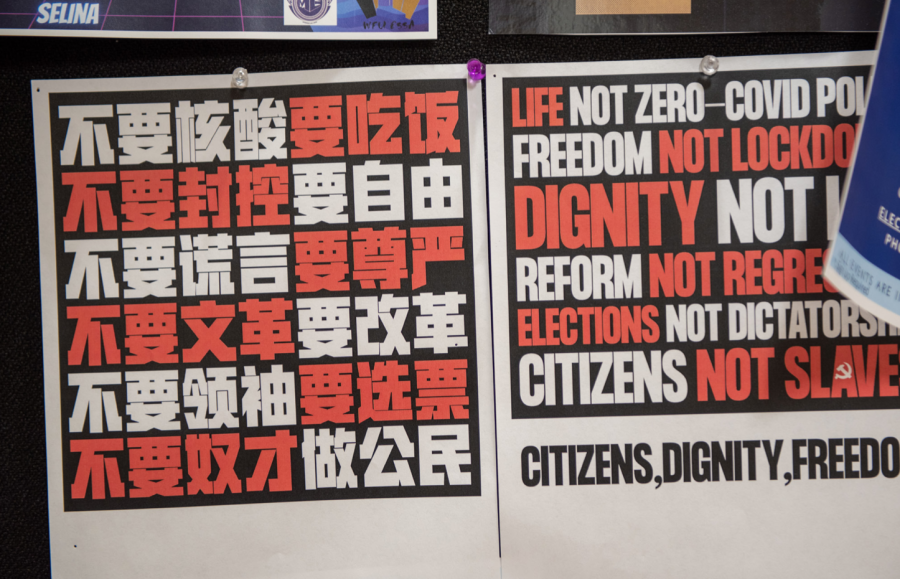“My family would be in danger”
International students face risks in hanging protest posters
In Fall 2022, News covered protest posters put up by Chinese international students to protest the election of Xi Jinping and China’s COVID-19 policies.
Protest posters criticizing the Chinese government and Chinese President Xi Jinping are currently hanging in multiple campus buildings at Wake Forest in response to China’s 20th National Congress of the Chinese Communist Party (CCP) in Beijing, which elected Xi to a third term.
Posted on the walls of Manchester Hall, Tribble Hall, ZSR Library and multiple South Campus residence halls, some posters called for the end of Xi’s presidency, calling him “a dictator.” Others featured photos from a banner attacking China’s zero-COVID policy that hung on Sitong bridge in Beijing, which, according to the poster, is currently censored in China.
The individual responsible for the banner on the Sitong Bridge in Beijing is referred to as the “banner-man” by many Chinese citizens. At this time, the identity of this individual is unknown.
Though many posters on campus show support for this “banner-man,” a student also put up posters in support of Xi and China’s zero-COVID policy.
According to reporting from ProPublica, U.S. national security officials confirmed that Xi’s government surveils its citizens even outside the country, including on college campuses. ProPublica also reported instances of international students’ families facing retaliation back home in China for speaking out against the Chinese government on their campus.
Due to fear of potential reprisal by the Chinese government, several interviewees have requested to remain anonymous. The Old Gold & Black respects these requests out of the utmost caution for these students.
For clarity purposes, the students who elected to remain anonymous will be referred to as “Student A” and “Student B.”
It represents the consciousness of democracy and a fight against authoritarianism. If there is no rule of law and intervening power, dictatorship is inevitable. — Student A
An anonymous professor in the Department of Politics and International Affairs described the current political situation in China.
“China has just ended the 20th party congress of the CCP, and Xi is widely expected to be reappointed as the party’s general secretary for an unprecedented third term,” they said. “In the past two terms for 10 years, he has consolidated his power through the periodical change of political elites for political support, constant anti-corruption campaigns to eliminate oppositions and the suppression of domestic sharp criticisms.”
Student A, a student involved in putting up the posters, said they printed and posted the material during fall break. They mentioned that one of them has received verbal harassment on Instagram and WeChat, a messaging service owned by Chinese tech giant Tencent.
“I have considered the risk,” they said. “But in [the] United States, I have the right to exercise my freedom of [expression].”
The student mentioned dissatisfaction with the zero-COVID policy in China, which, aiming at eliminating the number of COVID-19 cases domestically, continued to restrict international traveling. This created a significant barrier when the student went back to China during the summer break. They had to be quarantined for weeks before returning home.
Their family had also been negatively impacted by the restrictions, as their father had been unemployed due to the constraint of foreign trade.
“I think the person who put up the banner is courageous,” said Student A, referring to the photo of the protest banner in Beijing. “It represents the consciousness of democracy and a fight against authoritarianism. If there is no rule of law and intervening power, dictatorship is inevitable.”
Another student involved, Student B, expressed concern after being harassed online following the putting up of their posters. This student has since reported this incident to the Dean of Students.

At the time of publication, the Dean of Students did not immediately return the Old Gold & Black’s request for comment.
“If he wanted to report this to the Chinese government, my family would be in danger,” they said.
They also express concern for other Chinese international students involved in the protest.
“If we want to go back to China, we might be affected by the things we did.”
Student B claims to have had incidents with the Chinese government and censorship in the past. They have had government officials show up at their house after spreading similar messages back in their home in Beijing.
Despite this, the student strongly believes in the positive effect that placing these posters will have in educating others about the issue.
When asked about how the university should involve itself in the issue, Student B responded saying, “We just want the university to protect our freedom of speech.”
Junior Lance Wang has also put up posters around campus — in opposition to the posters of those supporting the “banner-man” in Beijing.
Wang states that he believes China’s zero-COVID policy is the best possible strategy for the Chinese government to be taking at this time.
“Although China has a considerably high vaccination rate, the effectiveness is much lower than Pfizer and Moderna due to different technology,” Wang said. “China has a much higher population density than that of America, and China’s medical system is still vulnerable and developing in both quantity and quality.”
He continued: “It’s unrealistic for China to coexist with COVID-19 at this point because the price is unaffordable, and COVID-zero is the most socially responsible and economically beneficial policy at this point.”
In response to the posters criticizing Xi, Wang said: “It’s irresponsible to stigmatize President Xi just because he has claimed a third term. Democracy is a very broad and subtle term, and the form of democracy varies among different pragmatic situations, social culture and historical periods.”
“I have a good understanding of Xi’s history and the history of the CCP, and I think his economic philosophies and pragmatic values have made his place in the party,” Wang said. “It’s always good to be skeptical, but what the poster expressed is pure hate and malice, and they failed to consider both sides of Xi’s third term.”
Wang continued: “I [oppose] the people who put up these irresponsible posters because they just talk but have never taken action. It’s important to understand that no civil struggles are solely because of the government and usually take long-term consistent efforts.”
He also explained that these posters perpetuate a bias against the Chinese government.
“For some self-evident reasons, China and the Chinese government are portrayed in a negative way by Western mainstream politicians, and these misleading posters will do nothing but strengthen this bias,” Wang said.
For some self-evident reasons, China and the Chinese government are portrayed in a negative way by Western mainstream politicians, and these misleading posters will do nothing but strengthen this bias. — Lance Wang ('24)
Wang concludes with a request to those responsible for the original posters: “Talk less, and do more.”
Despite respecting opposing opinions, Student A responded to Wang’s argument with disapproval.
“If you look at the process of changing the constitution in any other countries, not a single one of them has such a high approval rate in China, not even in Russia,” they said. “It is a step back for democracy.”
They also said that Wang’s comparison between Xi and Angela Merkel, former Chancellor of Germany, is problematic, remarking that Merkel’s 16-year reign in her position is a result of an “authentic civic election.”
The U.S. government has expressed its disapproval of Xi’s third term. In response, the U.S. government has announced a large ban that will block China’s access to the purchasing and production of advanced semiconductor chips.
Given the increased international tension, the aforementioned Wake Forest professor believes that Xi and the Chinese Communist Party are trying to tighten their grip on the government to ensure domestic stability and national unity.
He also released a statement to the Old Gold & Black regarding how these issues may be impacting international students from China.
“It may be an unpleasant and awkward situation for international students from China whenever their class discussions and personal conversation with friends are related to China.”
He continued: “We all need to remind ourselves of the academic institution’s mission in education and commitment to knowledge advancement through [the] free exchange of ideas and tolerance of various perspectives. All these can be achieved by empathic understanding, rational dialogues and reasonable arguments.”
Editor’s Note: Another writer contributed to this article but has chosen to remain anonymous due to fear of reprisal.
Update: In a previous version of this post, two paragraphs were repeated. That error has been corrected.
Correction Nov. 3: In a previous version of this article, the name used to refer to Chinese President Xi Jinping was incorrect on second reference. We have since corrected the error.

Breanna is a junior from Wilkes County, N.C. majoring in communication and minoring in journalism and linguistics. Outside of the OGB, she is the vice...












